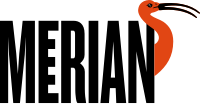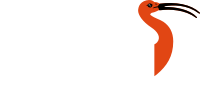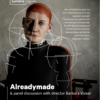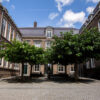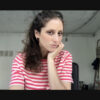On 5 October 2022, members of MERIAN (Maastricht Experimental Research In and through the Arts Network) offered workshops on “Writing Differently” to researchers in the MUSTS research group (Maastricht University Science and Technology Studies) at the Faculty of Arts and Social Sciences (FASoS).
Below are the complete “writing differently” workshop descriptions.
Writing Matter
Ulrike Scholtes and Ruth Benschop, Hogeschool Zuyd
In this workshop we will first invite participants to experiment with and write about the concrete, everyday material conditions under and about which we write. Secondly, we will guide participants in folding meaning to see what happens. The workshop focuses on writing practices during research processes and aims to explore and open up ways of sensitizing ourselves to and with materiality by writing.
Walking and Writing through Figments
Christian Ernsten, FASoS
Following (Pink 2009) and (Hamilakis 2017) we suggest that walking is a strategy of dealing with the assemblage or the interrelatedness of perception, material objects, place, knowing, memory and imagination. Through the bodily engagement, the process of walking, we understand ourselves in relation to our environment. Tim Ingold argues that as we walk our experience of the landscape becomes “figmented”, and thus it is through these imaginary frames that we understand our walk (Ingold, 2010: 17). One of our concerns is during this workshop the manner in which we report on our walks. Here we take inspiration from anthropologist Anna Tsing, who as part of her plea for an “arts of noticing”, introduces a fresh way of telling stories, namely as “open ended assemblages of entangled ways of life”(Tsing 2015, viii). Tsing writes in an explorative and conversational style resisting a typical modernist analytical framework.

Fabulating & Fictionalizing in Research
Flora Lysen and Jacob Ward, FASoS
In this workshop we explore the effects of “making up” elements in research. What can historians learn when they ask “what if” questions, invent fictional archival documents or cite from fictional oral history interviews? What can anthropologists learn when they create a thick description of a self-invented phenomenon? And what can sociologists learn when they reflexively create data they could otherwise never get their hands on? Reflecting on fiction in relation to doing research may offer insights into our disciplinary forms and norms, for example regarding notions of facticity, validity, rigour, reflexivity, ambiguity, generalizability, fraud and authenticity. But in this workshop, doing the exercise of fictionalizing or “making up,” actually trying to write, is also meant to help us realise which sources are otherwise unavailable to us and to better understand what styles and forms we recognise as significant and “real”.
Performance script writing for giving voices to all agents in your research
Antye Guenther, FASoS, MERIAN PhD-candidate and Inge Römkens, University College Maastricht
Script or screenwriting is a process of writing a text for an unfolding in time-space. The screenplay format — a form in which settings, movements, actions, dialogues and stage directions are written down to structure scenes— allows not only to express the story visually, but to approach a topic or text multi-dimensionally. Both the story and the performing of the story become present via stage directions. In this way, (performance) script writing is able to challenge the linear structure of written language as well as the inner logic of written narratives. This format also permits a lively treatment of non-human characters. In this workshop we will explore this intriguing format together and play with its possibilities.

